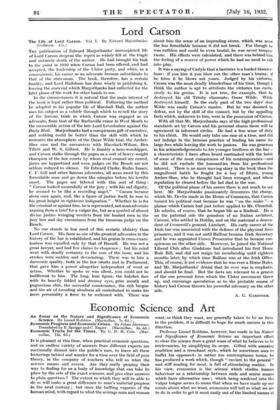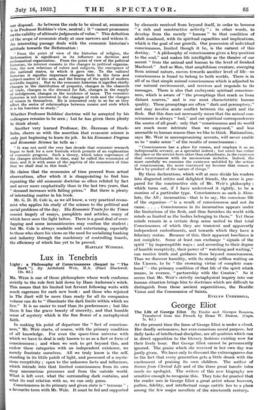Economic Science and Art
An Essay on the Nature and Significance of Economic
Science. By Lionel Robbins. (Macmillan. 7s. 6d.)
,Economic Progress and Economic Crises. By Johan Akerman. Translated by E. Sprigge and C. Napier. (Macmillan. 8s. 6d. ) Economic Tracts for the Times. By G. D. R. Cole. (Mac- millan. 12a. 6d.) IT is pleasant at this time, when practical economic questions, and an endless variety of answers from different experts are continually dinned into the public's ears, to leave all these bickerings behind and wander for a time over the field of pure theory, in the company of teachers who tell us what the science means and covers. Are they really groping their way to finding for us a body of knowledge that can take its place by the side of the exact sciences, and give clear answers to plain questions ? The extent to which they will be able to do so will make a great difference to man's material progress in the next century ; but since the baffling vagaries of the human mind, with regard to what the average man and woman
want, or think they want, are generally taken to be an item in the problem, it is difficult to hope for much success in this direction.
Professor Lionel Robbins, however, has made in his Nature and Significance of Economic Science an important effort to clear the science from a great mass of what he believes to be irrelevancies, by simplifying its scope. Gifted with amazing erudition and a trenchant style, which he sometimes uses to buffet his opponents in rather too contemptuous terms, he has produced a work which, though " caviare to the general " and stiff reading for most, is full of stimulating matter. In his view, economics is the science which studies human behaviour as a relationship between ends and scarce means which have alternative uses ; which being rendered into the vulgar tongue seems to mean that when we have made up our minds about what we want, economics will tell us what we are to do in order to get it most easily out of the limited means at our disposal. As between the ends to be aimed at, economics is in Professor Robbins's view, neutral ; it " cannot pronounce on the validity of ultimate judgments of value." This definition of the scope of economic study at once narrows and widens it. An interesting passage deals with the economic historian's attitude towards the Reformation : " From the point of view of the historian of religion, the Reformation is significant in its influence on doctrine and ecclesiastical organization. From the point of view of the political historian, its interest consists in the changes in political organiza- tion, the new relations of rulers and subjects, the emergence of the national states, to which it gave rise. To the cultural historian it signifies important changes both in the form and subject-matter of the arts, and the freeing of the spirit of modern scientific inquiry. But to the economic historian it signifies chiefly changes in the distribution of property, changes in the channels of trade, changes in the demand for fish, changes in the supply of indulgences, changes in the incidence of taxes. The economic historian is not interested in the changes of ends and the changes of means in themselves. He is interested only in so far as they affect the series of relationships between means and ends which it is his function to study."
Whether Professor Robbins' doctrine will be accepted by his colleagues remains to be seen ; but he has given them plenty to think about.
Another very learned Professor, Dr. Akerman of Stock- holm, cheers us with the assertion that economic science is only just beginning to learn its job. In his Economic Progress and Economic Science he tells us : " It was not until the very last decade that economic research began to look for a new formula which permits of an explanation of economic progress. Such a theory, which takes cognizance of the changes attributable to time, may be called the economics of tune, and it is with some of the aspects of the economics of time that we shall deal in this book."
He claims that the economics of time proceed from actual observations, after which it is disappointing to find him repeating the old economic doctrine so often refuted by fact and never more emphatically than in the last two years, that " demand increases with falling prices." But there is plenty of interesting matter in his book.
Mr. G. D. H. Cole is, as we all know, a very practical econo- mist who applies his study of the science to the political and social problems of the day. His Economic Tracts for the Times consist largely of essays, pamphlets and articles, many of which have seen the light before. There is a good deal of over- lapping and some inconsistencies may confuse the student ; but Mr. Cole is always readable and entertaining, especially to those who share his views on the need for socializing banking and industry through the machinery of controlling boards, the efficiency of which has yet to be proved.
HARTLEY WIT TIERS.



































 Previous page
Previous page